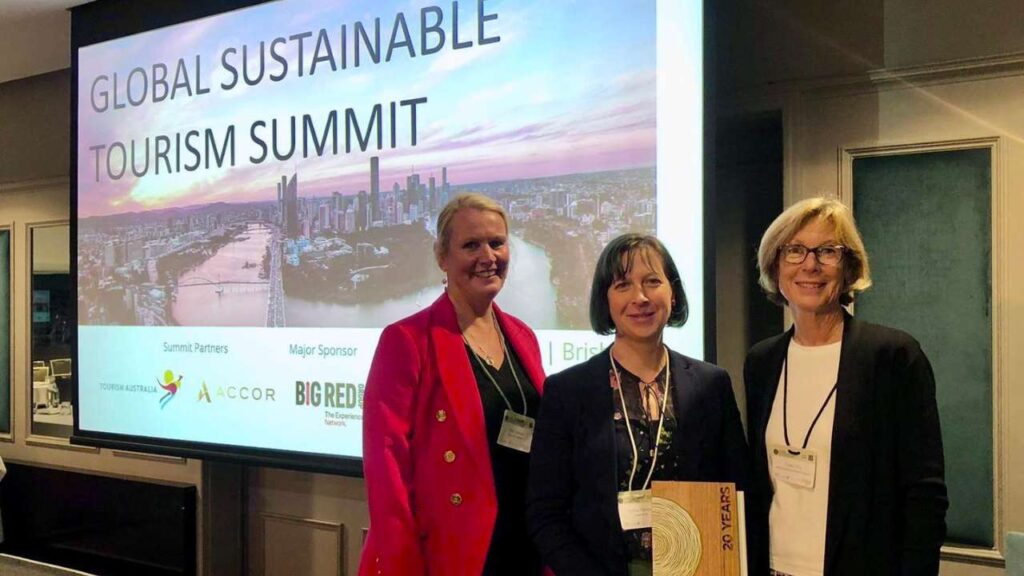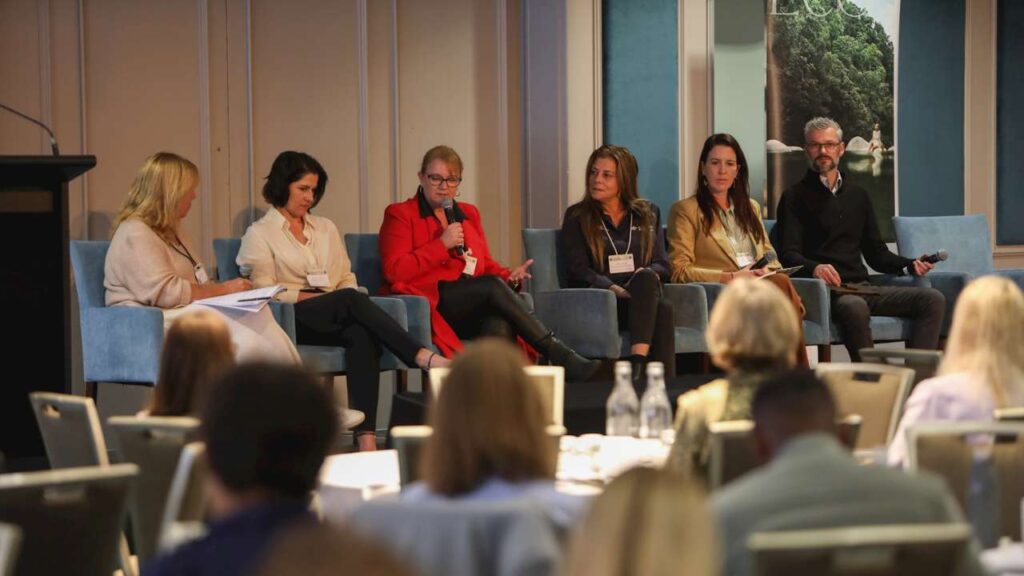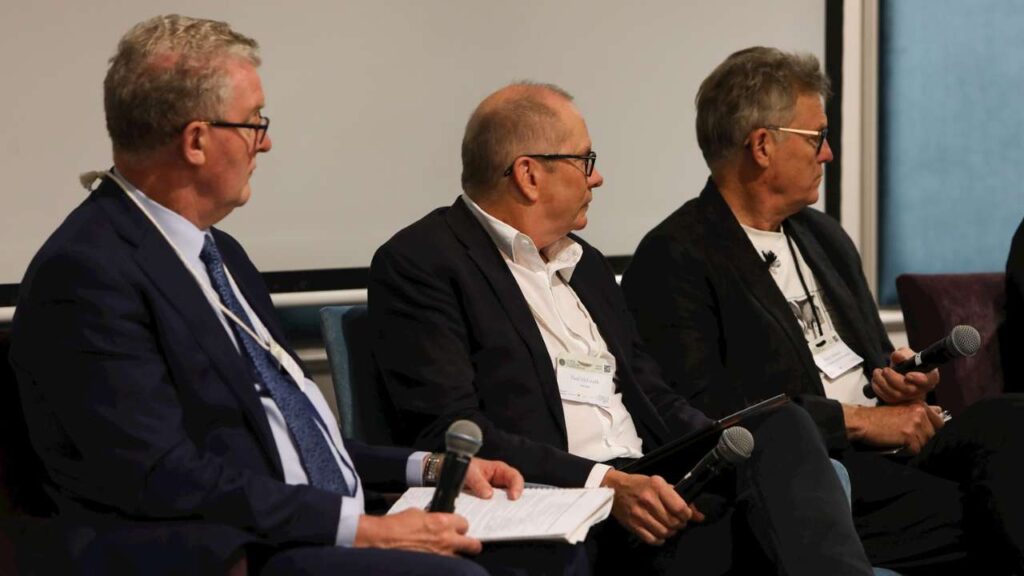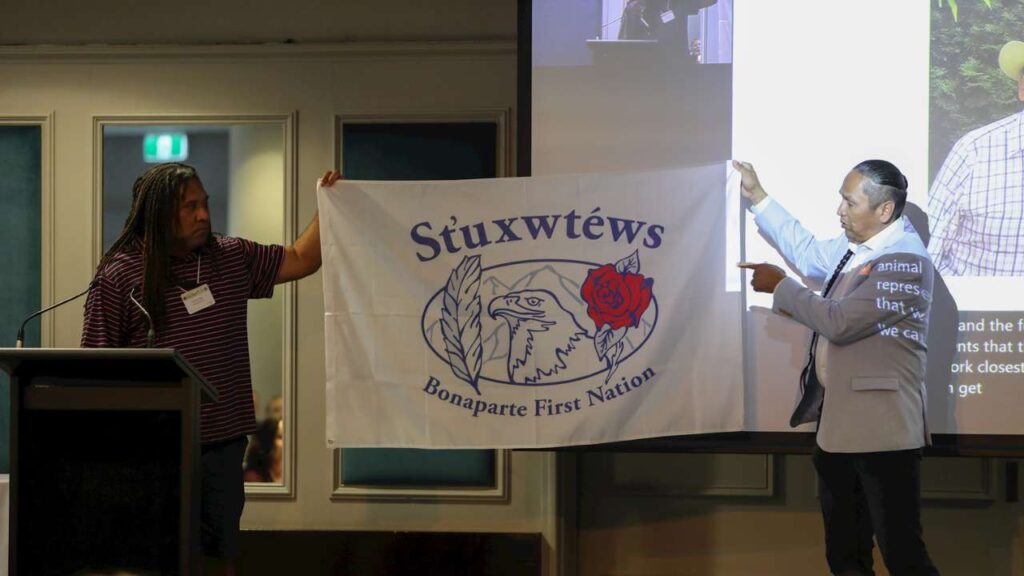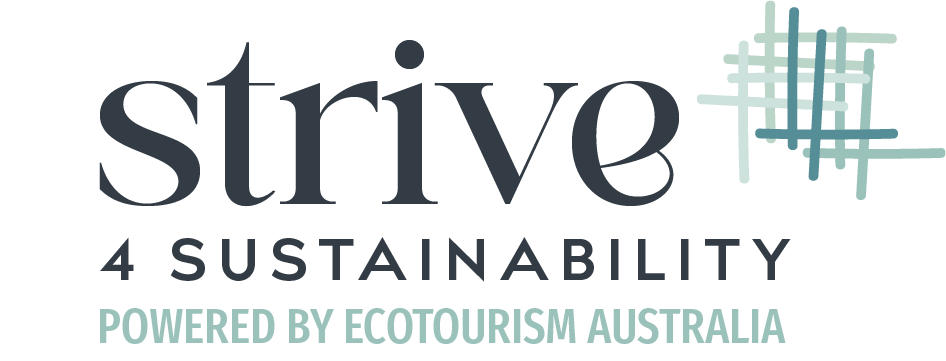
by Ecotourism Australia | Jul 4, 2024 | Media Release
Balloon Aloft first to achieve Sustainable Tourism Certification on sustainability pathway
In a milestone achievement, Balloon Aloft has become the first tourism operator in Australia to progress through the Strive 4 Sustainability Scorecard and then achieve Ecotourism Australia’s globally recognised Sustainable Tourism Certification.
Operating in stunning regional areas of New South Wales, including The Hunter Valley, and Bourketown in outback northern Queensland, Balloon Aloft is a family owned and operated business committed to providing sustainable and accessible ballooning experiences for all adventurers.
Matthew Scaife, pilot and director of Balloon Aloft said their commitment to sustainability and quality tourism experiences were at the heart of their certification.
“Our Balloon Aloft team is committed to preserving the environment, reducing our carbon footprint and promoting sustainability through a range of initiatives across our ballooning operations,” said Mr. Scaife.
“We partner with Greenfleet to include carbon offsetting in every ticket we sell and are proud ambassadors of the Sea Shepherd organisation, flying the Sea Shepherd balloon in an effort to raise awareness for the organisation’s vital work in marine conservation.
“Our participation in the Ecotourism Australia Strive 4 Sustainability program in July last year was a great way for us to review all of our sustainability goals and outcomes with our scorecard benchmark score of 97% giving us the confidence of taking the next step towards certification.
“We are thrilled to have achieved Ecotourism Australia’s Sustainable Tourism Certification and will continue to work with our Balloon Aloft team and our amazing passengers in an effort to make a positive impact on the environment and the communities in which we operate our flights.”
Ecotourism Australia’s Chief Executive Officer, Elissa Keenan, offered her congratulations to the iconic business.
“Balloon Aloft have proved their commitment to sustainable tourism practices and identified themselves as an ideal candidate for our global best-practice Sustainable Tourism Certification,” Ms Keenan said.
“We created the Strive 4 Sustainability Scorecard as a precertification pathway program, to help tourism operators start their sustainability journey and it is wonderful to see Balloon Aloft go from a benchmark assessment to taking the next step and achieving global best practice certification in sustainable tourism.
“We have seen enormous interest from industry and in 2023 we partnered with Big Red Group to support operators on this sustainability journey. To see an industry leader like this seek opportunities to build sustainability capacity through our program is incredible.
“Their support to showcase operators who are making a difference and ensuring their customers can see those sustainability credentials, is a significant commitment and a true demonstration of one of Australia’s largest tourism organisations to ‘walk the talk’ on sustainability.”
Chief Sustainability Officer at Big Red Group, Ms Jemma Fastnedge, said, “We are moving toward a travel industry where sustainable tourism is no longer a nice-to-have but an essential component of running a successful operation.
“As the largest marketplace of experiences across Australia and New Zealand, we recognise our responsibility to incorporate sustainability into our ethos and encourage tourism experience providers to do the same. We are delighted to see Balloon Aloft go from a very high Scorecard result to achieving full certification.”
The Strive 4 Sustainability Scorecard was launched by Ecotourism Australia in partnership with Founding Partner Tourism Australia in late 2022. To compliment Ecotourism Australia’s world first and leading ECO Certification for nature focused experiences, the Sustainable Tourism Certification for non-nature focused businesses was also developed.
Sustainable Tourism Certification assesses tourism businesses against our internationally recognised sustainable tourism standard across the four pillars of sustainability: environmental, cultural, and socio-economic impact and sustainable business operations.
Discover Balloon Aloft on the Green Travel Guide.
Read the case study on Balloon Aloft’s experience through the Strive 4 Sustainability scorecard program.

by Ecotourism Australia | Jun 26, 2024 | Media Release
The Gladstone region proudly announced its ECO Destination Certification at the Nature Tourism level with Ecotourism Australia, underscoring its commitment to sustainable tourism. This significant milestone was led by the Gladstone Area Promotion and Development Limited (GAPDL) and supported by the Gladstone Regional Council.
Gladstone is the 10th ECO Destination across the nation certified by Ecotourism Australia.
The ECO Destination Certification adheres to global best practices through international partner, Green Destinations. The Certification recognises a region’s commitment to the four pillars of sustainability: environmental, socio-economic and cultural impact and sustainable business management.
It involves third party auditing of 73 criteria across seven sections including: Destination Management, Environment and Climate, Culture and Tradition, and Business and Hospitality.
“We congratulate the Gladstone Region on achieving ECO Destination Certification,” said Ecotourism Australia’s Head of Destination and Member Services, Alyssa Sanders.
“This recognition underscores the region’s unwavering commitment to sustainable tourism and sets a benchmark for future efforts. We are immensely proud to see Gladstone leading the way in promoting responsible travel practices and showcasing the incredible natural beauty and biodiversity of Central Queensland.”
The region is committed to offering eco-friendly and sustainable tourism products that align with international best practices. There are six certified operators championing sustainability in the region with Lady Elliott Island, 1770 LARC! Tours, Broadwater Haven, Wilson Island, Heron Island Resort, 1770 Reef and Dive Spear and Sport all holding global best practice ECO Certification.
1770 LARC! Tours and Lady Elliott Island are recognised in Ecotourism Australia’s Hall of Fame for holding 20 years of continuous ECO Certification.
GAPDL have built on the industry’s foundation of sustainable tourism and lead the stakeholder collaboration to achieve this destination wide recognition.
“We are so proud of our beautiful region for achieving this significant milestone, which is a testament to the community’s collaboration and dedication to preserving our stunning natural environment. Attaining ECO Destination Certification will establish Gladstone as a world-class destination, highlighting the region’s dedication to continuous improvement in sustainable practices and its provision of high-quality nature-based tourism experiences,” said GAPDL’s CEO, Nicola Smith.
The certification process, initiated in early 2023, was funded through the Queensland Government’s Department of Tourism and Sport’s Eco-certified Tourism Destination Program Grant Fund. This grant supports councils and tourism organisations in achieving high-level ECO Destination Certification.
Member of Gladstone Glenn Butcher said the certification was a fitting reward for the region’s tourism businesses who have focused on making their operations as sustainable as possible.
“Achieving ECO Destination Certification will help highlight to visitors from around the world the natural wonders and sustainable tourism operators the region has to offer,” said Mr Butcher.
“As part of our Towards Tourism 2032 strategy the Queensland Government is working with industry to position the state and our tourism destinations as leaders in sustainable tourism.
“This program provides up to $150,000 to eligible applicants to achieve certification and it is a worthwhile investment, as we strive to meet a growing demand from tourists for places that have a genuine commitment to sustainable low impact travel.”
Tourism and Events Queensland CEO, Patricia O’Callaghan said this is fantastic news for Queensland.
“Congratulations to the Gladstone region on this major milestone of becoming an ECO Certified Destination.
“The region has some world-class operators who are doing incredible work to promote and embody sustainable tourism.
“Gladstone is the fourth Queensland destination to become ECO Certified which highlights our industry’s dedication to environmentally responsible management of our stunning natural resources, while also providing visitors from across the globe the opportunity to immerse themselves in the beauty of our state.”
To achieve this certification the Gladstone region underwent rigorous onsite auditing involving interviews with council and GAPDL staff, community and conservation groups, business representatives and First Nations representatives, along with site visits to key tourism and environmental areas. To maintain certification, ongoing sustainability commitments are essential, with audits conducted every two years to track progress and implement recommendations.
The Council’s support to their community in achieving a sustainability-driven future for tourism has been clear throughout the application process.
“We are delighted to obtain the ECO Destination Certification and join an established global network of over 200 destinations working towards ecotourism excellence. The certification assures visitors to our region that we are committed to the continuous improvement of sustainable practices and to providing high-quality nature-based tourism experiences,” said Gladstone Region Mayor Matt Burnett.
Situated along the stunning coastline of Central Queensland, Gladstone is a gateway to two iconic natural wonders: the Southern Great Barrier Reef and the pristine waterways of the Gladstone Harbour. This region is renowned for its breathtaking natural beauty, with a significant portion of its area dedicated to protected natural landscapes that support rich biodiversity.
Gladstone is also home to the world-famous Heron Island, a prime destination for marine life enthusiasts, and the ecologically significant Capricorn Coast National Park. These areas offer visitors unparalleled opportunities to explore and appreciate the diverse ecosystems that make Gladstone a premier nature-based tourism destination.
Ecotourism Australia’s Head of Destination and Member Services, Alyssa Sanders, is in Gladstone today at the ECO Destination Certification Announcement event to award Gladstone Regional Council with their official certificate and present to key stakeholders.
END
Media event details:
• Date: Wednesday, 26th June
• Time: 12:00 pm – 12:45 pm (Media Opportunity and Formalities only)
• Location: Tondoon Botanic Gardens (On the grass area to the left of the café) – Main car park available.
Media contact:
Ecotourism Australia – Jillian Santry, Communications and Events Officer e: communications@ecotourism.org.au ph: 07 3256 6777
About Ecotourism Australia
Ecotourism Australia is a non-government, not-for-profit organisation, established in 1991, that promotes and supports the ecotourism industry in Australia through building capacity and actively promoting sustainable tourism operations and systems. We are recognised as the credible, national peak body for sustainable and nature-based tourism in Australia.
Our foundational program – ECO Certification – was the world’s first national ecotourism certification program. We have more than 1,900 certified experiences in our ECO, Sustainable Tourism, Climate Action, and Respecting Our Culture Certifications. Ecotourism Australia’s certification programs, including the new Sustainable Tourism Certification, are acknowledged and recognised globally. We have a consumer-facing website that features every Sustainable Tourism Certified operator, ECO certified operator, and certified ECO certified Destination in Australia: https://greentravelguide.org
The ECO Destination Certification was developed by Ecotourism Australia using the international Green Destinations standard, which is recognised by the Global Sustainable Tourism Council. The Certification assesses a region across the four pillars of sustainability and the destination must pass an on-site audit conducted by a third-party auditor before Certification can be granted.
In late 2022, a new Sustainable Tourism program was launched including a pre-certification benchmarking tool in the Strive 4 Sustainability Scorecard with founding partner Tourism Australia to support the broader tourism industry to demonstrate their commitment to, and be recognised for, the four pillars of sustainability: environmental, cultural, financial/business, and socio-economic impact.
Ecotourism Australia has global partnerships, working with the United Nations Educational, Scientific and Cultural Organisation (UNESCO), the United Nations World Tourism Organisation (UNWTO), Green Destinations (an international organisation for sustainable destination development); and key partnerships in the Asia-Pacific region including with WWF-Australia, Parks Australia and the Great Barrier Reef Marine Park Authority (GBRMPA). Ecotourism Australia is also a member of the Global Sustainable Tourism Council (GSTC).

by Ecotourism Australia | Jun 25, 2024 | Article
Risks and opportunities for sustainable tourism was at the heart of Ecotourism Australia’s inaugural 2024 Global Sustainable Tourism Summit centred on the theme People, Planet, Place, Purpose. More than 280 passionate sustainable tourism operators and businesses, destinations, government departments and national park agencies, solutions providers, researchers, and conservation advocates congregated in Meeanjin/Brisbane for the event. Each state and territory in Australia as well as five internationalities were represented at the Summit, allowing attendees to gain a sense of the common challenges faced by the industry and how we can work together to overcome them.
In case you missed the Summit, or are looking to refresh your memory, we share our key takeaways from 62 speakers across the two days of conferencing.
Summit Day 1 Takeaways
On Summit Day 1 we opened the Summit with a Welcome to Country delivered by Shannon Ruska, who shared his story highlighting the diversity and value of Welcome Ceremonies. From Senator the Hon. Don Farrell, Minister for Tourism and Trade, attendees caught insights to the Australian government’s plan for sustainable tourism growth and their commitment to the industry before Bede Fennell of Tourism Australia shared the latest consumer trends as well as Tourism Australia’s own sustainability journey.
Chief Frank Antoine, Chief of the Bonaparte First Nation and founder of Moccasin Trails, dived into a case study of Indigenous Tourism Done Right sharing personal stories of his heritage and the role tourism plays in connecting us to each other and our past, present and future – “arrive as a guest, leave as family.” To round out the first session, David Young, Director of Sustainability at Accor Pacific revealed how the hotel industry is facing increased pressure to address environmental challenges from above and below resulting in Accor setting the ambitious goal to have all 406 of the region’s properties certified by 2025.
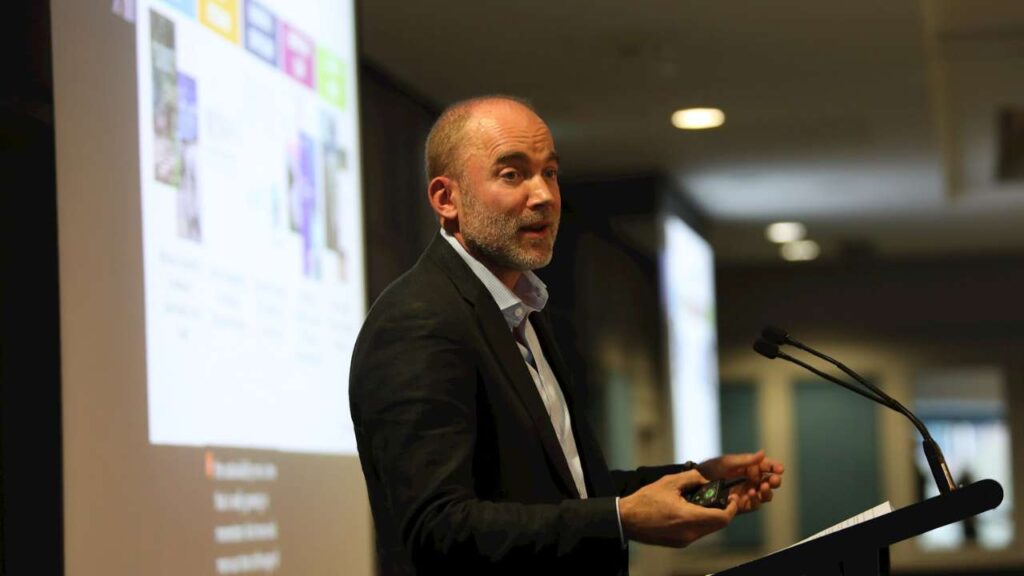
Bede Fennell, Executive General Manager of Corporate Affairs delivers the opening keynote presentation, The Future of Sustainable Travel. Credit: Mad Panda Media.
Fostering respectful partnerships with Indigenous communities through tourism took centre stage throughout the Summit program and Matt Cameron-Smith, CEO of Voyages Indigenous Tourism Australia, presented a case study of Wintjiri Wiru, emphasising Indigenous engagement isn’t just about talking to local communities, it’s about listening. Cliff Cobbo, First Nations Principal Advisor at WWF-Australia, noted by 2026, 50% of WWF-Australia’s work will be delivered in partnership with Indigenous people and organisations, while Annette Sharp, Global Social Impact Manager of Intrepid Travel, shared an inspiring good-practice case study from Machu Picchu about sharing iconic tourism experiences with residents.
After lunch, Julie Cheetham, Managing Director of Weeva, demonstrated how sustainable technologies are helping tourism operators to understand and measure their impact, followed by an impactful presentation from Flight Centre’s Global Sustainability Officer, Michelle Degenhardt, laying out her advice for a step-by-step guide to starting your sustainability journey. The third session concluded with a thought-provoking discussion about the Future of Air Travel with panelists exploring the Australia’s capability for Sustainable Aviation Fuels and the likelihood of electric flights for short route, small group flights in the next 10 years.
For the final session of the day, attendees dived into all things Sustainable Cruising where panelists explored the challenge of social license for cruise lines and how, with appropriate management and foresight, cruising can benefit and empower destinations and communities. Our next panel explored Regenerative Tourism and what it looks like in their business; panelist Nic Cooper of Wild Adventures Melbourne (WAM) shared their regenerative practices have a profound impact on guests and although customers don’t book because of their ECO Certification, 75% of visitors mention WAM’s sustainability actions in their post trip reviews. Our last discussion centred around Ecotourism Legacy Leaders with longstanding ECO Certified operators Steve Edmondson (Sailaway), Anthea Hammon (Scenic World) and Lizzie Corke OAM (Wildlife Wonders) revealing their lessons over the years. For example, Anthea shared how their ECO Certification is important to educate and achieve sustainability commitment from their staff.

At the Summit, Ecotourism Australia’s Board Chair Dr Claire Ellis presented Anthea with Scenic World’s Hall of Fame award, recognising the business’ achievement of 20 years continuous ECO Certification.
Our Summit Day concluded with the World Environment Day Cocktail Function hosted in partnership with Queensland Tourism Industry Council (QTIC) where attendees discussed learnings from the day, while feasting on delightful bites. The evening featured a panel conversation with Australian Age of Dinosaurs’ David Elliot OAM and Naomi Miles, exploring their business development and sustainability journey, including their designation as Australia’s first International Dark-Sky Sanctuary.
Summit Day 2 Takeaways
Bright eyed and eager to learn more, our attendees joined for a second day of the Summit, which took a deeper dive into the practical tips and tricks for sustainable tourism. Nadine Schramm, Head of Sustainability at Ecotourism Australia opened the day with insights from the pathway Strive 4 Sustainability Scorecard program and leaving delegates with the moving quote: “Sustainability takes forever, and that’s the point.”
Next was an informative discussion on the best ways to work with Indigenous communities to build tourism collaboratively. Chief Frank discussed the importance of connecting with multi generations to build community and share stories, and TRC Tourism’s Kylie Ruwhiu-Karawana engaging presentation reminded us to keep checking the back of the waka (Māori canoe) to ensure no-one’s been left behind on the consultation journey. Kingfisher Tours’ Rosie Sandover and Rebecca Sampi highlighted how engaging and championing Indigenous staff can empower them to “walk in our own way.” Gunditjmara Traditional Owner, Uncle Denis Rose, detailed Budj Bim Cultural Landscape’s UNESCO World Heritage journey and in particular how transparent communication with locals helped achieve buy-in, and, to round out the panel, Luke Barrowcliffe of Studio K’Gari outlined some of the challenges of Indigenous representation. Our Destination Best Practice panel followed, exploring challenges of overtourism, engaging local businesses on the sustainability journey and the need for effective partnerships.

Destination Best Practice Panel featuring from L-R: Janet Mackay (TRC Tourism; Facilitator), Simone Novello (Blue Mountains City Council), Lori Modde (Australian Regional Tourism), Fiona Merida (Great Barrier Reef Marine Park Authority), Whitney Edwards (Destination Central Coast), and Saul Cresswell (Shire of Augusta Margaret River). Credit: Mad Panda Media.
With the launch of Ecotourism Australia’s Sustainable Tourism Certification and Strive 4 Sustainability Scorecard in 2022, our audience is now larger than ever. Our second session of the day split into two breakouts; one for nature-based tourism and the other for urban tourism. Here are just three of our main insights from these discussions:
Nature Based Tourism Focus
- Accessibility in Nature Tourism – people with accessibility needs will make the best decision for themselves, don’t remove the sense of adventure by restricting or determining their access.
- The Future of Wildlife Tourism – seeing an animal in their natural habitat can be just as or even more thrilling than a ‘meet and greet’ animal experience, however educating guests to adopt an ‘observer’ rather than ‘interactor’ behaviour is crucial to its success.
- Developing High Quality Experiences Around Unique Australian Locations and Themes – creating a high quality experience involves affecting all the senses (touch, feel, sight, smell) to leave visitors with a lasting, positive memory.
Sustainability in All Destinations
- Sustainable Gastronomy and Food Tourism – it’s not just food and beverage providers that need to be held accountable for food waste, but also consumers and the choices they make at home.
- Sustainability in the Accommodation Sector – international hotel guests are increasingly asking for eco credentials and sustainability action across all accommodation classifications.
- Leading Sustainable Tourism Examples in Urban Environments – starting the sustainability journey might be the hardest step, but it is the most rewarding.
Quentin Long, Managing Director at Australian Traveller Media, energised the audience with his impassioned presentation exploring the sustainability ‘say-do’ gap, however he noted that when businesses lead with sustainability at the forefront, consumers will follow. Austrade’s Head of Visitor Economy Sustainability, International Markets and Tourism Research, Grant Ferres, shared Tourism Research Australia plan to release a dashboard in the coming months to track indicators including against key sustainability outcomes. Our penultimate panel explored Sustainable Distribution Channels with a clear message that international buyers and wholesalers are looking for validated and reliable eco credentials that are easy to identify. Our final panel, Creating a Net Positive Impact – Alternatives to Offsetting, left the audience on a high note, with Jenny-Lee Scharnboeck of Take 3 For the Sea sharing a positive impact story of their recent partnership with Norwegian Cruise Line in Fiji, where 80 cruisers, local police authorities and community members banded together to remove 514kg of litter from a single beach.

Sustainability in the Accommodation Sector panel featuring from L-R: Michael Johnson (Accommodation Australia; Facilitator), Paul McGrath (YHA Australia), Peter Johnson (Diamond Waters Treehouse Retreat), and Joanne Whitby-Lee (booking.com; out of camera). Credit: Mad Panda Media.
Risks and Opportunities from the Global Sustainable Tourism Summit
Throughout the event we asked our attendees to participate in an activity where they shared their risks, opportunities and solutions across the four pillars of sustainability that are impacting and driving the future of sustainable tourism. Results from this exercise identified common themes:
- Collaborate, engage and listen as an industry
- Joint voice led by a peak industry body like Ecotourism Australia
- The need for joint Australian expert leadership group on sustainability
- Talk less and do more – We are running out of time to be more sustainable! (2030 Sustainable Development Goals, Thrive 2030 etc)
- Storytelling – bridge the gap between visitors and sustainability
- Bring everyone (including businesses, local community and visitors) on the shared sustainability journey
- Listen to the younger generation and give them a seat at the table when developing sustainability plans
- Focus on thriving, not just mitigating negative impacts
- Enormous opportunities remain for regional areas to capitalise on positive socio-economic impacts of tourism
- Ban all single-use plastic items & encourage plastic free places across Australia
- Partnerships and collaborations across industry and sectors is key
- Authentic engagement
Events like the Global Sustainable Tourism Summit are so important to connect with all sectors of the tourism economy to learn from each other, and to discover the challenges organisations are facing and how they are working to overcome them.
Wrap Up Takeaways
To conclude, there were a number of impactful messages the reverberated throughout the Summit, that kept recurring again and again in presentations and through conversations. These are just a few of the best takeaways from the Global Sustainable Tourism Summit:
- “Tourism can help us save what we cannot afford to lose.” Tourism can be a powerful and inspirational mechanism for storytelling, conservation, and community-building, so long as we put People, Planet, Place and Purpose first.
- Tell your story. Sharing your journey and experiences fosters greater connection and change.
- “Look forward in the micro, look backward in the macro.” Take your sustainability journey one step at a time, and suddenly you’ll have walked a marathon.
- Authentic engagement is about listening. Showing up is one thing, but being present, purposeful and listening is another.
- Just start. Sustainability is not about perfection, it is a journey, but that journey cannot start without commitment. Start with what makes a difference to you.
- The land we stand on is the land we stand for.
- To lead we need to listen.
- Arrive as guests, leave as family.
- Plan for the visitor you want, manage the visitor you have

Chief Frank Antoine, Bonaparte First Nation Chief, (right) explains the symbols on the St’uxwtews flag, which was later gifted to Fraser Nai (Strait Experiences; left). Credit: Mad Panda Media.

by Ecotourism Australia | May 31, 2024 | Article
Ecotourism Australia, the peak national body for nature-based and sustainable tourism, will hold its 2024 Global Sustainable Tourism Summit in Meeanjin/Brisbane from Tuesday 4 – Thursday 6 June.
Hosted at the Pullman Mercure Brisbane King George Square, which was one of the first hotels in Australia to achieve Sustainable Tourism Certification from Ecotourism Australia, the event will position sustainability at the forefront to inspire and empower tourism businesses and industry.
Ecotourism Australia Chief Executive, Elissa Keenan, said Ecotourism Australia is proud to deliver the Global Sustainable Tourism Summit to support tourism stakeholders on their sustainability journey.
“The Global Sustainable Tourism Summit will be key to raising the importance and uptake of sustainability actions across the Australian visitor economy by championing the leaders and problem-solvers who are delivering world’s best practice.
“We are delighted to feature a high calibre of speakers on our inaugural Summit program to discuss the critical risks and significant opportunities for sustainable tourism and to share insights, learnings and leading case-study examples with more than 260 delegates.”
Accor Pacific’s Chief Operating Officer, Adrian Williams PM&E, said they are proud to be supporting the Summit as a Partner sponsor.
“Accor is the largest hotel operator in Australia and we love playing a leading role in inspiring new standards for sustainable tourism in the hotel industry. I truly believe that the path to a more sustainable hospitality model begins with collaboration. Forming and nurturing the right partnerships with high-impact organisations, like Ecotourism Australia, is essential to help achieve our ambitious sustainability goals. We are so honoured to be a partner of their Global Sustainable Tourism Summit and are looking forward to coming together with other industry leaders in June to work towards our common goal of responsible hospitality.”
Pivotal discussions will follow the event’s theme, “People, Planet, Place, Purpose” based on the four pillars of sustainability: environment, socio-economic, culture, and management.
Over the course of two conference days on 5 and 6 June, keynote speakers and panellists will delve into some of the most critical topics for the industry such as sustainable cruising, aviation, wildlife tourism, collaborating with indigenous stakeholders, and global consumer and industry trends, while considering the risks and opportunities for eco and sustainable tourism.
More than 60 speakers are featured on the program including Chief Frank Antoine (Bonaparte First Nation, Canada), Bede Fennell (Tourism Australia), David Young (Accor Pacific), Annette Sharpe (Intrepid Travel), Cliff Cobbo (WWF-Australia), Matt Cameron-Smith (Voyages Indigenous Tourism Australia), Michelle Degenhardt (Flight Centre Travel Group) and Paul McGrath (YHA Ltd), in addition to myriad ECO Certified and Sustainable Tourism Certified operators and destination representatives, showcasing the latest innovations and global best-practice sustainability examples.
The Global Sustainable Tourism Summit will host more than 260 tourism industry professionals in Brisbane including tourism operators, destination managers, state and regional tourism organisation representatives, government officials, national parks agencies, academics, and industry association leaders.
The event kicks off on Tuesday 4 June with a Sustainability Tour of applicant ECO Destination, Scenic Rim, and a Welcome Function at the Pullman’s Sixteen Antler’s Rooftop Bar, ahead of the main two-day Summit program. A World Environment Day Cocktail Function on Wednesday 5 June, hosted in partnership with Queensland Tourism Industry Council, will also offer networking opportunity for delegates.
This is the inaugural Global Sustainable Tourism Summit and follows Ecotourism Australia’s previous Global ECO Conference, one of the world’s longest running ecotourism conferences.
Learn more about the Global Sustainable Tourism Summit program and speakers here: www.ecotourism.org.au/conference
END
Media contact:
Ecotourism Australia – Georgie Snare, Communications and Events Officer e: georgie@ecotourism.org.au ph: 07 3256 6777

by Ecotourism Australia | May 29, 2024 | Case Study, Destination NSW
Marine and Whale Watching Tours
Mulubinba/Newcastle & Awabakal/Lake Macquarie, NSW
Experience the Newcastle and Lake Macquarie coastline and its marine life with CoastXP aboard one of their two custom-built vessels.
“At CoastXP we participate in a broad range of sustainability activities. The main reason we were attracted to the Strive 4 Sustainability Scorecard was that it allowed us to audit the initiatives we’re already undertaking in our business and see further opportunities for sustainable tourism exploration and implementation,” explains Dom, the founder of CoastXP.
The Scorecard gave them a deeper understanding of sustainable tourism principles and practices. They found some areas of sustainability were already addressed in their current activities, while others still needed more attention, particularly surrounding the need to implement new policies to support their business’ sustainability. Furthermore, involving their team in the sustainable tourism conversation and decision-making is something they want to improve in the future.
“The process was clearly broken down into digestible sections, which meant we could work on our submission, save our progress and return to it at any time. Each section had a brief description of what was expected, and we could submit as much or as little as we liked. There was no right or wrong. I enjoyed that we could tackle it at our own pace,” says Dominic about his experience with the Scorecard.
After completing the Scorecard, the submitted answers and documentation are assessed by an expert coach from Ecotourism Australia. According to Dominic, the coach’s remarks were comprehensive and suggested additional content and useful templates that could be included in CoastXP’s existing business plan, as well as new policies that they could add to their operations. Another helpful insight for them was to engage more with their local suppliers which they are passionate about continuing in the future.
CoastXP is committed to sustainability, community engagement and responsible tourism, which they communicate on their website. They want to minimise their environmental impact and support the well-being of the community, for example by offering a carbon offset alternative for passengers on every one of their tours.
As the next steps on their journey, they now want to work with their team on the new ideas they received through the Scorecard. They also plan to use the Scorecard to promote their results and their active involvement in sustainable practices.
CoastXP completed their Strive 4 Sustainability Scorecard on 29 April 2024 and is a snapshot of their current sustainability practices. The scorecard is not a certification and is valid for 12 months upon completion.
Ecotourism Australia invites you to attend our Annual General Meeting (AGM) at 11 am AEST on Monday, 20 October 2025, hosted online via Zoom. This is an important opportunity for members to engage in the governance of our organisation and shape its future direction.At this year’s AGM, the Board of Ecotourism Australia will present a proposed new Constitution for member approval.
The proposed Constitution has been designed to:
- Introduce a balanced structure of member-elected Directors (maximum 5) and Board-appointed Directors (maximum 4)
- Update Director terms from 2 years to 3 years, with a maximum of two terms (6 years total)
- Meet current regulatory requirements for a Company Limited by Guarantee
- Be modernised and contemporary to meet Ecotourism Australia’s strategic imperatives and our objectives
- Provide a streamlined and concise governance framework.
As required under the Corporations Act 2001, the new Constitution must be formally adopted by members through a special resolution at the AGM. This means that at least 75% of members present and voting will need to support the resolution for it to pass. Your vote is therefore important in shaping the future governance of Ecotourism Australia. The draft Constitution is available for download below.
We have an Expression of Interest (EOI) for Directors for the Ecotourism Australia board. Please note that while EOIs will be open, no new Directors will be appointed before the AGM.
Your participation is vital to ensure our governance reflects the strength, professionalism and sustainability goals of our membership.
Thank you for your continued support of Ecotourism Australia. We look forward to your involvement at the AGM.




